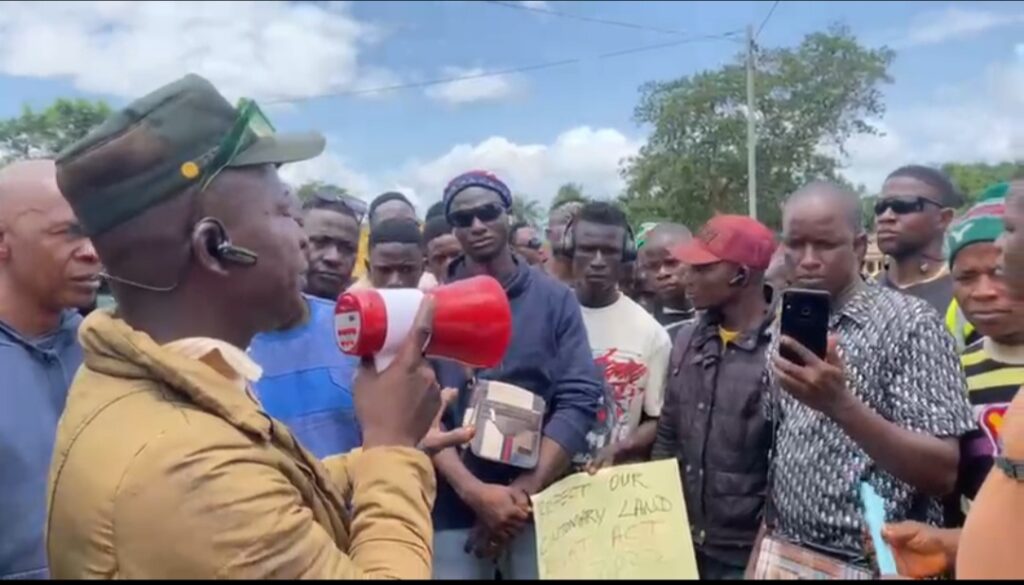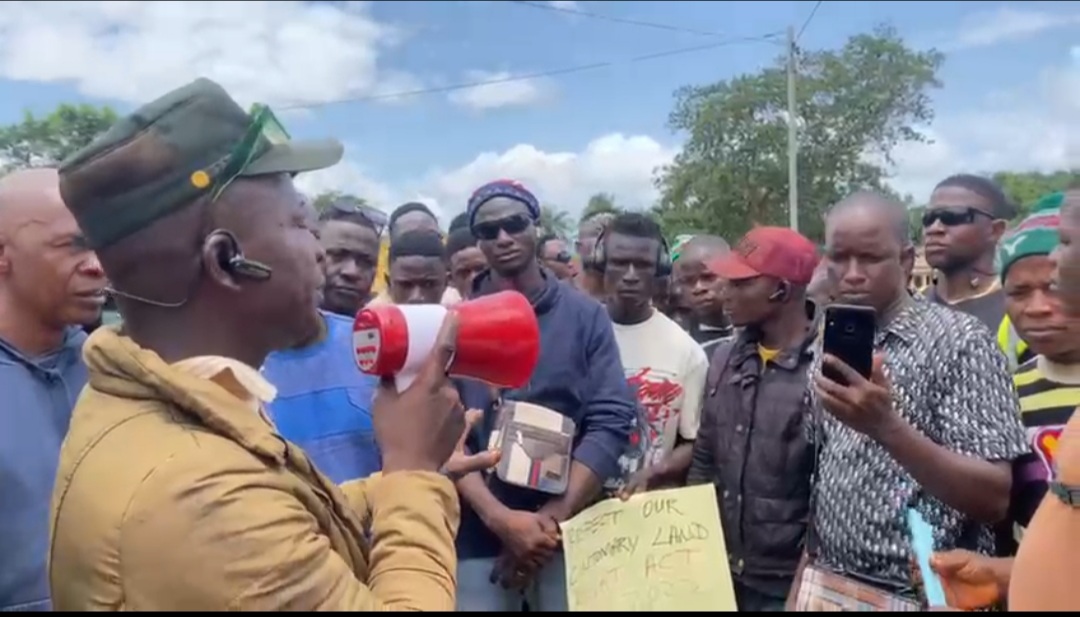
SLMMDMC CHASED OUT!
…KASAFONI LAND OWNERS CHOOSE GENTO
On Thursday, August 21st, 2025, a significant protest erupted in Diang Chiefdom in Koinadugu District, challenging the authority of a government delegation led by Minister of Finance, Ahmed Sheku Fantamadi Bangura. The delegation arrived to discuss land lease agreements concerning the controversial Kasafoni Iron Ore deposit, only to be met with fierce opposition from local landowners who have already established a contract with the Gento Group of Companies.
The situation came to a head as hundreds of frustrated landowners, waving placards and chanting slogans, expressed their discontent with the government’s intervention. Many voiced concerns over potential duplications in land lease agreements, emphasizing the legality and legitimacy of their existing contract with the Gento Group, which had already initiated developmental projects in their communities. These projects included the construction of essential infrastructure, such as roads, a water dam, and a hospital—initiatives that the locals see as vital for their future welfare.
The refusal of the local people to engage with the visiting officials forced the delegation to meet only with the Paramount Chief, Sheku Magba III, and his cabinet members. This prompted questions surrounding a perceived lack of transparency and community involvement in discussions that directly affect the livelihoods of the landowners.
The backdrop of these protests is steeped in a complex web of political and legal challenges. Sources within the Attorney General’s office revealed ongoing pressures on the Paramount Chief, with some elements of his cabinet reportedly facing serious allegations, including murder charges. The implications of these allegations may have played a significant role in the dynamics at play during the meeting with government officials. Not only does this raise concerns about the integrity and stability of local governance, but it also further complicates an already volatile relationship between the government and the residents of Diang Chiefdom.
At the center of the conflict is the land lease agreement signed between the people of Diang, its surrounding Dansogoia and Sambaia Chiefdoms, and the Gento Group. The surface rent for this agreement has been paid, and the locals feel a deep sense of loyalty towards the company, seeing it as an indigenous partner capable of driving development and prosperity in their region. As one landowner passionately stated, “We are not opposed to development, but we want to ensure that it does not come at the cost of our rights and the agreements we have already made.”
Amidst rising tensions, the Chief Minister has reportedly requested Parliament to intervene and halt any further negotiations until the matter is resolved amicably. This petition reflects growing anxiety regarding the direction the negotiations are taking and the community’s insistence on maintaining their original agreement with the Gento Group.
The Mines and Minerals Development Act stipulates that a lease comprises a formal written permission granted for land usage related to mining activities, signed by both the landowner and the lessee. In this case, the local landowners believe their established lease with Gento grants them the exclusive right to negotiate future dealings related to the iron ore deposit without external interference. They view government attempts to renegotiate or revise these terms as a breach of trust and a threat to their autonomy over land resources.
The frustrations among the residents are clear: they do not want to rehash agreements that they have already settled, particularly when they have begun to witness tangible benefits from their partnership with the Gento Group. “We have big plans with Gento,” another local landowner noted. “They are not just giving us promises; they are delivering results, which is why we stand firm in our decision.”
The protests raise broader questions about land rights and the role of local governance in Sierra Leone’s mining sector. Historically, foreign companies have often entered into agreements with national authorities, sidelining local communities and resulting in conflicts over land ownership and resource management. The current situation in Diang Chiefdom exemplifies these ongoing struggles and highlights the need for reforms in how land leases and resource extraction are handled, ensuring more collaborative engagements that respect local rights and voices.
As frustration simmers and negotiations stall, both the government and the community must navigate a path toward resolution that honors existing agreements while fostering a climate of trust and mutual benefit. The outcome of this deadlock will not only impact the future of the iron ore deposit but also set a precedent for similar disputes across Sierra Leone. For now, the people of Diang remain resolute in their demands for recognition and respect for their rights over the land they inhabit.
